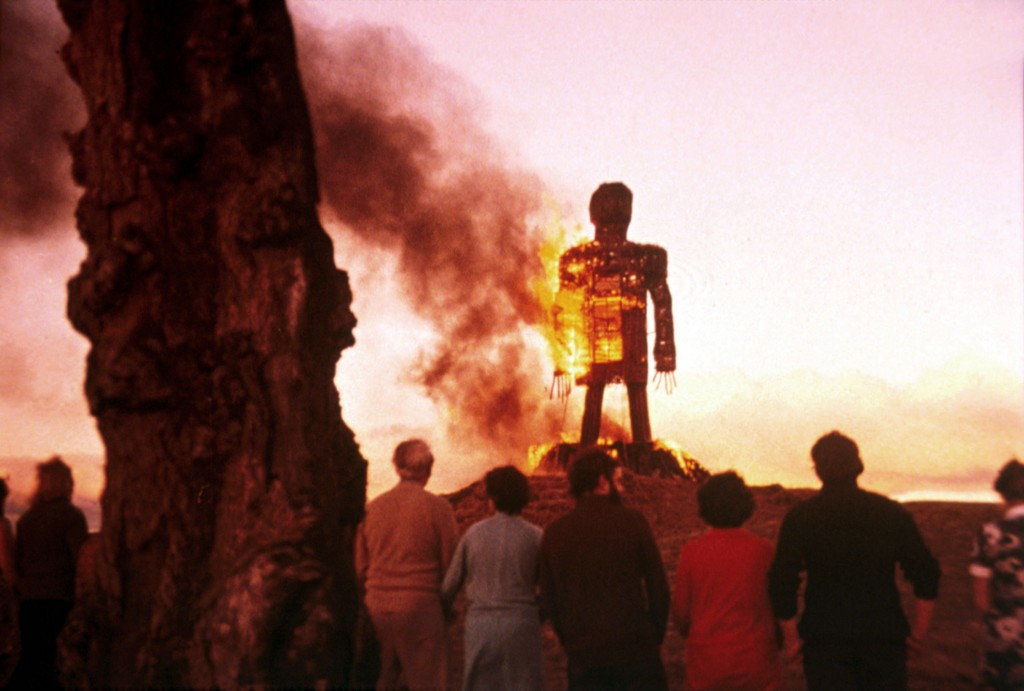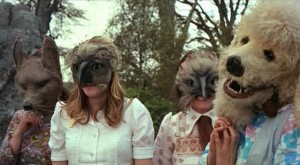The Wicker Man (1973)
What keeps you up at night in fear? Aliens? Serial killers? Spirits that only move blankets or close doors to make themselves noticed to home cameras? (I’m looking at you, Paranormal Activity)
Horror might possibly be the most misunderstood genre of film due to people’s belief that it can only involve gruesome deaths, jump-out scares or terrifying antagonists. While these characteristics are not necessarily bad, it presents a limited scope of what horror movies are and can be. In general, strong horror films should play to an audience’s primal fears and evoke an uneasiness to the events occurring. This could be accomplished through traditional horror fare i.e. werewolf or, as The Wicker Man presents, a pagan village blinded by their overzealous religious belief. There is no supernatural being or gore or attempted shocks, but in its place, a strong focus on the character’s interactions and a increasing sense of dread for the main character’s fate. This build-up culminates in the climatic finale, where all of the thematic and stylistic elements resound together.
The strongest aspect of the film is the “folky” style presented. The film’s setting is a quaint oceanfront town in the British Isles, with architecture that could have existed for the past few centuries. Many shots of people are intermixed with the island’s natural fauna, helping to create a vision of a society untouched by modern culture. The accurate portrayal of certain pagan rituals continues this folk style, as the traditional garb in ceremonies or appeal to deities seems torn straight from the old world. Even the music, surprising me by being sung by the townspeople at key scenes, was composed to reflect past traditional values or understandings of the world.
Through the idealogical disagreements between Neil and the townspeople, the story’s theme unfolds into an investigation of the destruction blind religious faith causes. The climax shows the townspeople’s abandonment of humanity in favor of their own beliefs, but Neil isn’t completely righteous himself. His devout thinking of Christianity as the “true religion” is evident in his contempt for the townspeople’s methodology, forging a schism. In the last scene, the singing of the folk song “Sumer Is Icumen In” and Neil’s psalm-reciting interweave together, creating a wall of sound where individual words can become indecipherable. It infers an idea about how religious fever, at its core, is shared and the attempts to separate faith based on sects only leads to deep-rooted animosity.
While this movie possesses numerous positive aspects, the major flaw of the movie boils down to the portrayal of Neil. I can understand the necessity of portraying a strong dichotomy between the Christianity values and the Paganism values, but he acts so self-righteous about everything that it is hard to give much sympathy to him. Usually, horror (or any genre, in general) movies work more effectively when we can connect to the characters and emphasize with the troubles they encounter. With Neil, though, I felt very little attachment to him until the end.
Yet, even with this misstep in characterization, the uniqueness and intelligence permeating this film makes it a must-watch, especially for those that don’t like the conventional horror fare.





I have heard of this movie, and I really like your reviews. I never thought of a movie such as this as a horror movie, but it’s an interesting point of view. You definitely seem like an expert on movies and I love the insight I get from reading each review. I’m excited to see the next one!
Catch the devil, or catch the Hippie? I love how you describe the tensions and the feelings during the 70’s, period of protestation and revolts. And how the movies are impacted by it.
I love your writing style. And I love this blog. You are so good at thinking and writing about film! I hope you continue this and add to the posts for each decade.